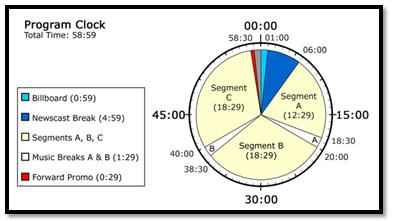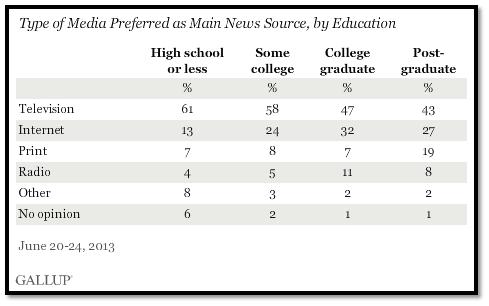There’s are a lot of shocked faces in the radio industry over this new Gallup poll revealing that radio comes in dead last as a main source for news and current events. I’m not sure why.
TV takes first place with 55% of the votes, followed by the Internet (21%), print (9%), and finally radio (6%). The “good news” is that radio trounces “word of mouth” (2%), so that’s a plus. On a more serious note, radio also scores better among 30-64 year-olds, as well as among those with a college degree and respondents who are employed full or part time.
My bet is that public radio is driving radio’s somewhat better performance in these demographic categories, while commercial radio stations that specialize in “news” are actually more likely to be “talk” stations.
So why should we be surprised by this data?
When you get right down to it, consumers who are looking to hire a medium or media source when they want news about current events are going to head to the most reliable, familiar source – cable news (which fulfills this job – albeit with bias in most cases – 24 hours a day) and news websites (same story).
If any industry group should be feeling lousy about this survey, it’s the Fourth Estate – newspapers. They specialize in news, but rapidly declining scores in research like this, as well as aging consumers make their utility and value very shaky.
In radio’s case, how could anyone complain about these scores? Because how much news is there on commercial radio?
 The CBS Radio all-news stations in major markets (except when they’re carrying play-by-play sports) like New York, Chicago, L.A., Philly, Detroit, and San Francisco are the exceptions, along with one-off’s like WTOP. They present a true news clock, but most other commercial stations that call themselves “news/talk” are a lot less of the former and a whole lot more of the latter.
The CBS Radio all-news stations in major markets (except when they’re carrying play-by-play sports) like New York, Chicago, L.A., Philly, Detroit, and San Francisco are the exceptions, along with one-off’s like WTOP. They present a true news clock, but most other commercial stations that call themselves “news/talk” are a lot less of the former and a whole lot more of the latter.
In an average hour on a typical “news/talk” station, is there any more than 5-10 minutes of news? There may be “news blocks” in the drives, but throughout the day, a heavy diet of real news is rare.
Of course, when there’s some kind of breaking news story or national disaster, these stations sometimes move into scramble mode and start providing wall-to-wall coverage.
But on an average day, how much news is there on most “news/talk” stations?
Consumers aren’t dumb. As Clayton Christensen reminds us, they “hire” radio to do certain jobs for them.
News, for better or worse, is no longer one of them.
- What To Do If Your Radio Station Goes Through A Midlife Crisis - April 25, 2025
- A 2020 Lesson?It Could All Be Gone In A Flash - April 24, 2025
- How AI Can Give Radio Personalities More…PERSONALITY - April 23, 2025





It would be interesting to know how much of the ‘internet’ score comes from viewing media-connected Web sites? With the mantra of all-content-on-all-platforms, we see serious online and mobile spikes to our News/Talk station sites when the news or weather events dictate. I would assume many good newspaper, TV and radio sites might see the same. But, you are correct in the case of stations running nothing but syndicated talk and (maybe) top and bottom of the hour news news breaks.
Good point, Mark, about the media related websites – could be a factor. Thanks for commenting.
Maybe Lee Abrahms thing will change that.
Robin, he’s been known to break ground…and break china. We can only hope. Thanks for taking the time.
Fred, who are the music stations doing radio news differently? Or are we all stuck in a rut that was ploughed years ago when it was easy? Is anyone delivering a product successfully across a music station, a mobile platform and their own website? I cant find them.
Commercial radio music stations – by and large – are not doing much in the way of radio news.